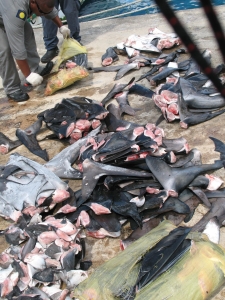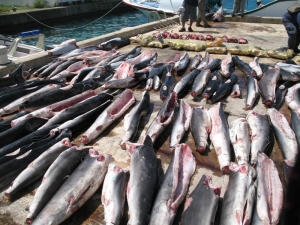Yesterday the Associated Press ran a story about the Western Pacific nation of Palau, who announced today at the United Nations its ban of shark fishing.
 Carl Safina reflects on how shark populations have plummeted over the years and that Palau is making groundbreaking efforts to reverse this tragic trend:
Carl Safina reflects on how shark populations have plummeted over the years and that Palau is making groundbreaking efforts to reverse this tragic trend:
I and everyone I’ve ever spoken to in any ocean can tell you that sharks are much scarcer than in the 1980s, and that catch rates are much lower. In fact, some species have virtually vanished from large areas.
Many older fishermen can tell you that sharks were abundant swimming near the surface in the 1960s, and that they’d usually see 50 or more over the course of a day. In those days, “finning” meant swimming along the surface with their fins sticking out of the water.
Most impressive to talk with, in my experience, are people who used to be aerial swordfish spotters here in the Northeast US. They can tell you there were so many sharks through the 1970s that the hardest thing about finding a swordfish (which were common then, too) was to spot one amidst all the sharks.

photo courtesy of Dan Klotz
While diving in Palau earlier this year, I had the impression that sharks remain common but not as abundant as in the mid-1990s.
Some sharks range large areas, so even shark fishing hundreds of miles away could greatly affect shark numbers in another area. However, this shark sanctuary is very welcome news. It’s big enough that if it can be patrolled effectively—and that’s a big ‘if’—it could make a real difference for the shark population of Palau.
Palau has continually done an outstanding job of turning living fish into sustainable cash. Early on, Palau banned the export of reef fishes, and as a result it has some of the best reef fish populations remaining in the world.
As reefs deteriorate and get stripped of fish elsewhere, Palau becomes increasingly valuable not just biologically but as a tourist destination, an ongoing cash cow for Palau itself. It is perhaps the best place in the world to see large humphead or Napoleon wrasse, now rare elsewhere. And because certain fish graze algae from coral reefs, overfished reefs elsewhere are overrun with coral-smothering algae.

photo courtesy of Dan Klotz
By contrast, Palau’s reefs are not only healthy but actually have recovered from widespread coral bleaching in the late 1990s. The bleaching was caused by abnormally hot water related to global warming. In most places, a reef with so many dead corals would have been quickly overrun by algae that would have prevented corals from regaining their foothold. That means the end of coral reefs in some areas. But in Palau, the still-abundant fishes suppressed the algae, allowing reefs to recover.
Palau’s visionary protection of reefs and the banning of shark fishing are policies of very high value not just to Palau itself, but increasingly, for the rest of the world as well.
How wonderful!!!
By: waterbaby87 on Sunday, October 18 09
at 5:39 pm
yes, it’s terrific.
Carl
By: carlsafina on Friday, October 23 09
at 12:50 am